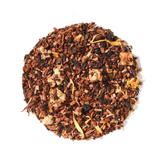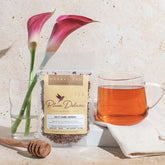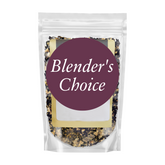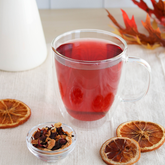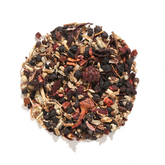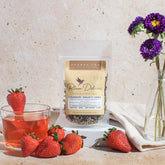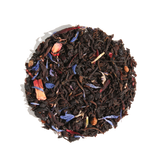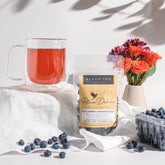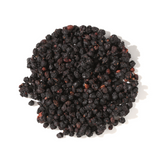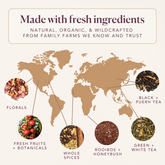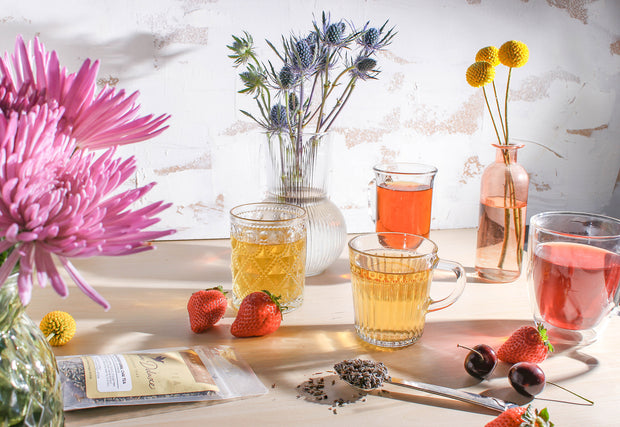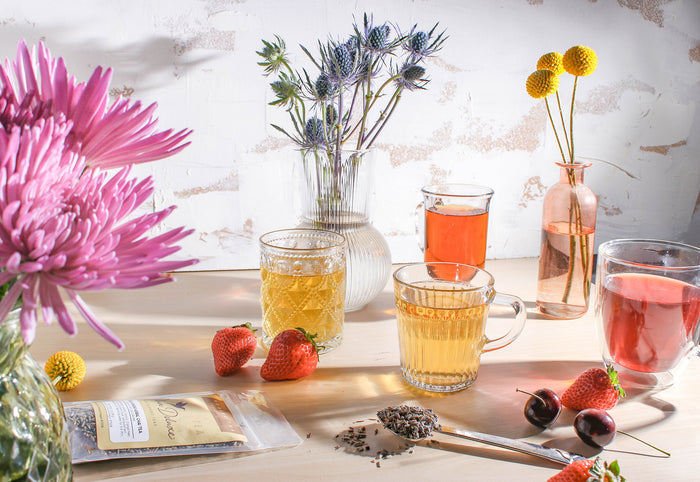
This content is not intended to be a substitute for professional medical advice, diagnosis, or treatment. All information and resources found within this article are based on the opinions of the author. Always seek the advice of your physician or other qualified health providers with any questions you may have regarding a medical condition.
The Benefits of Water
As we size up tea vs. water, let’s first take a look at the benefits of fresh water. The human body is made up of 60% water (sorry, fellow tea lovers, we are not made up of tea). While there are no antioxidants in plain water, it holds the critical building blocks our body needs to perform every task: hydrogen and oxygen. Water is essential for all systems of our bodies to perform optimally; it’s critical for everything from helping our hearts beat to having glowing skin.
If plain water feels like a snooze fest to you, remember that it can be snazzified with a squeeze of any citrus fruit, or infused with fresh fruit like raspberries or peaches. Try it with a sprig of basil and cucumber and you’ll be instantly transported to that fancy-spa feel.
Warm water is super soothing to the body and can be dolled up with a drizzle of honey and a slice of lemon. Enjoying warm water with lemon in the morning is an Ayurvedic practice that many health-conscious folks have adopted as their own. (Ayurveda is a holistic healing system originating in India.)

The Benefits of Tea
Now, what about tea in our tea vs. water challenge? As a healthy beverage, tea offers some additional benefits in the form of these lovely little helpers called antioxidants – substances that help protect our cells from damage and disease. You’re probably most familiar with the antioxidants Vitamins C and E. The antioxidants found in tea are called polyphenols and pack a punch with potent anti-inflammatory and cancer-fighting power.
For example, check out this article on the beneficial wonders of honeybush tea. This tea has been shown to help lower blood sugar levels, stimulate insulin secretion to balance metabolism, and promote the regeneration and protection of damaged cells.
Haven’t tried a honeybush tea yet? Give Evening in the Garden a test drive and I think you’ll be pleased as punch. It begins with fresh elderflowers – a unique herb not as often used in teas. Paired with lemon peel and rose petals to add a floral zing, it’s both refreshing and relaxing, with a touch of vanilla essence to finish.
Since most teas – except for the herbals – have some caffeine, one could contend that the caffeine is a drawback when it comes to tea vs. water. Some teas have more caffeine than others. Black teas have the most, while green and white teas will have lower levels of the speedy stuff. Of course, with herbal teas, one can reap the benefits of drinking tea while avoiding any negative impact from caffeine.

A delightfully healing brew is Pears and Cinnamon herbal tea. This warm and comforting blend even has historical significance. When Spain’s most revered mystic poet, St. John of the Cross, was kidnapped in 1577, he was imprisoned for 10 months before escaping. Near death due to dehydration and starvation, he sought refuge in a convent where the nuns nursed him back to health with warm pears and cinnamon.
Feeling a bit of emotional whiplash? Earl Grey tea may just hold the answer for you. This is a black tea that is flavored with oil of bergamot, which has been used in aromatherapy to support stress relief for a very long time, and with good reason. Bergamot is a type of orange that mainly grows in Italy and France and is said to be a hybrid of lemon and bitter orange plants. It’s been found that the oil supports feelings of relaxation and reduces stress.
Back to our tea vs. water debate. There used to be a belief that the diuretic effect of tea counteracted the hydration qualities, but this has since been debunked. You may have to make more trips to the restroom if you’re tossing back tons of tea, but you’ll also be hydrated.
It turns out that both tea and water are very healthy choices! The combination of a few glasses of fresh water alternated throughout the day with a few hot cups of tea will be sure to jumpstart your hydration levels.
And as with everything in life, it’s about balance. When it comes to choosing tea vs. water, tuning in to your healthy hydration is a great way to give yourself some extra love.

![Spring Break Tea Variety Pack [6-Pack Variety of Flavors]](http://www.plumdeluxe.com/cdn/shop/files/spring-break-pack.jpg?v=1740682266&width=165)

